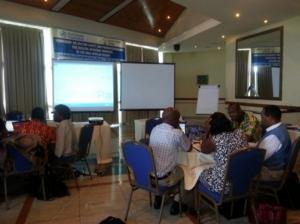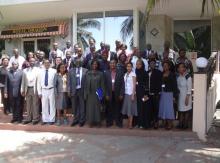Vaccine safety and Pharmacovigilance Workshop for Anglophone Countries held in Accra
A three-day workshop was organized from 28-30 April 2014 for eight Anglophone countries in Accra, Ghana, brought together five participants each from Ghana, Nigeria, Zimbabwe, Tanzania, Ethiopia, Malawi, Kenya and Uganda. The participants were drawn from national EPI, National Regulatory Authority, Pharmacovigilance centres, and WHO national Focal Persons for EPI and Essential Medicines and Health Products. The workshop was facilitated and technical support provided by WHO HQ, WHO AFRO and WHO IST/ESA.
The specific objectives of the workshop were to (i) map national vaccine pharmacovigilance capacities (ii) present WHO training/capacity building resources for vaccine pharmacovigilance and their applications to the local context and most importantly (iii) to develop national work plans for vaccine pharmacovigilance activities for 2014 – 2015.
Briefing participants on the rationale of the workshop, Professor Bartholomew Akanmori from the WHO AFRO Regional Office in Brazzaville, Congo, expressed the uniqueness of the workshop as this was the first time personnel from EPI and NRA were brought together in one forum to discuss issues related to vaccine pharmacovigilance. Professor Akanmori said the workshop was timely as many countries on the continent are introducing new vaccines such as rotavirus, polio, pneumococcus, measles-rubella etc. into their routine immunization programmes. He said the workshop was an opportunity for the country teams to develop joint action plans for their respective countries.
Mrs Elizabeth Adjei-Acquah, Deputy-Director of Pharmaceutical Services of the Ghana Health Service (GHS) performed the official opening on behalf of the Director General of the GHS. She indicated that pharmacovigilance is as important as the vaccination because lapses in the monitoring and management of adverse events following immunization (AEFI) can affect community patronage and the entire national immunization programme. Mrs Adjei-Acquah urged the participants to remain focused and work as a team to develop effective plans to improve vaccine safety and pharmacovigilance in various countries.
Country teams developed their draft actions plans as expected to be finalized with inputs from larger groups when they return to their countries




